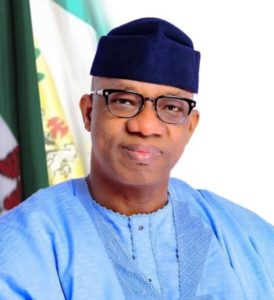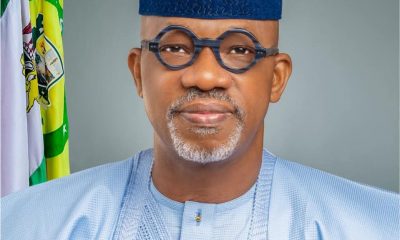Opinion
Ogun: Dapo Abiodun’s Infrastructure As A Drive To Economic Prosperity
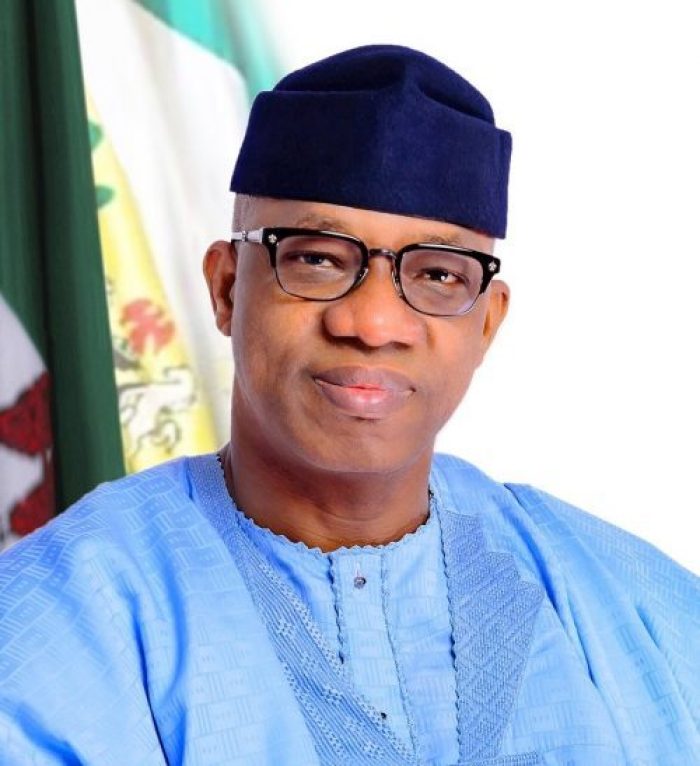
Ogun: Dapo Abiodun’s Infrastructure As A Drive To Economic Prosperity
“Infrastructures are essential services that should be put in place to enable development. Socio-economic development can be facilitated and accelerated by the presence of social and economic infrastructures.”
-Dr K. A. Familoni, Economist
What is happening in Ogun State where Governor Dapo Abiodun is spreading projects around all the Senatorial Districts like confetti, and the way the citizens within and outside perceive this is analogous to the tale of the elephant and the blind men of Hindustan. A group of blind men heard that a strange animal, called an elephant, had been brought to the town, but none of them was aware of its shape and form. Out of curiosity, they said: “We must inspect and know it by touch, of which we are capable”. So, they sought it out, and when they found it they groped about it. The first person, whose hand landed on the trunk, said, “This being is like a thick snake”. For another one whose hand reached its ear, it seemed like a kind of fan. Another person, whose hand was upon its leg, said, the elephant is a pillar like a tree trunk. The blind man who placed his hand upon its side said to the elephant, “is a wall”. Another who felt its tail described it as a rope. The last felt its tusk, stating the elephant is that which is hard, smooth and like a spear.
While many perceive the achievements of Governor Abiodun, especially in the area of infrastructure, differently, this writer, like one of the Hindustan men, wants to view it from the prism of how it enhances economic development. From day one, Governor Abiodun appreciated (and still does) the role of investment as the engine of economic growth. For this, he established the Ogun State Investment Promotion and Facilitation Agency. It was “with a mandate to attract investors into the State; coordinate the private sector investment activities, and streamlining processes and procedures to ease the investors’ journey to setting up their operations successfully in the state.” Other supplementary initiatives include capacity building for well over 500 entrepreneurs across the State to enable them to access financing and also scale up their businesses; empowerment of over 2500 rural women across the state through the provision of products worth N100m; land acquisition within 30-day for the issuance of C of Os through the launch of an online portal and above all Ogun State Land Administration and Revenue Management System (OLARMS).
Governor Abiodun recognises the global nexus between economic development through investments and the provision of infrastructure. And he has been doing just that. Over 270km of new roads, accumulating to 661.76km, and 99.1km, cutting across the three senatorial districts have either been constructed or reconstructed, while over 562.63km of roads are ongoing throughout the state.
When some media executives embarked on a facility tour of our state, piloted by the Commissioner for Works and Housing, Engineer Ade Akinsanya, they had a first-hand feel of the infrastructural developments going on. The tour train moved to the Abeokuta-Sagamu expressway where they saw the flyover bridge over the Sagamu-Benin expressway. The visitors touched the Ijebu-Ode Mojoda expressway, Molipa express on Ibadan road, Igan road in Ago Iwoye and many other places. Inner city roads were not left out. The visitors saw the road linking Molusi College, Owode-Ilaro road and Atan-Lusada road, among others. The housing projects at Kemta and other areas were spectacular.
Not a few of the visitors wondered about the si, simultaneous works going on in the Ilishan-Ago Iwoye road, the Sagamu-Iperu roundabout, Oba Eriwole road, the Ilaro-Owode road, Somorin-Kemta road, Olomore-Sani road or the Mile 2-Ayetoro road. The tour train moved to the Ijebu-Ode Epe road constructed by Craneburg. That road was commissioned by President Mohammadu Buhari recently. The Atan-Lusada road was another major project that the people saw.
In Ogun Central, the Abiodun government built the Obantoko road, Ikoritameje Adenrele/Close Titan Vespa road, Idi Aba-Oke Lantoro road, the Abeokuta-Shagamu expressway, the Channels TV road in Isheri, Panseke-Adigbe road, the flyover bridge at Kuto, Lafenwa Rounder-Ayetoro road, Adatan Gbonagun road, Arepo road (for which members of the press had agitated for years), Somorin Kemta-Idi Aba road, Osoba-Toyin Agbado road, Itori junction road, Olomore Sani road and the Akute-Ishasi road. Road projects are ongoing at Old Bank road-Oritameje Coker, Mowe Ofada, Siun, Sango Roundabout to I joke bridge and Oke Aro-Ojodu.
Ogun East Senatorial District is also feeling the impact of Dapo Abiodun’s infrastructural spread, especially in communities such as Oru-Awa Ilaporu, Molipa, Fusigboye, Ayegun, Ojofa, Asafa Oke and Asafa Isale. Irgun-Ilisa road, Idarika Street road, Olabisi Onajole Road and Araromi Sokoto street road, has made their lives.
Among others, the administration has completed the Esure-Ijebu Mushin road, Igan road, Ekinrin-Idowa-Ibefun-Itokin road, Awujale road, Ijebu Ode-Epe/Sagamu Benin interchange flyover bridge, Molusi College road, Ilishan market road, Iperu-Roundabout Ode phase 2, Obafemi Awolowo Way-Mada Takete and the Molipa-Ibadan road. Residents of Oyingbo, Olisa, Saka Ashiru, Togburin, Agoda, and Tigara, among others, know the relief that building their roads has brought to their communities. They can attest to the work done in other areas, including the Sagamu Ode Lemo road and the Ikenne-Alishan Ago Iwoye road. In Ogun West, it has projects galore from Ikola to Osi Ikola, from Raypower road to Igbesa-Ejinla road; from Imshai-Igan to Ayetoro; and from the Ilaro-Owode road, the Oke Ola road in Imeko, the Ilashe Koko-Alari road and the Ado Odo-Ikoga road. The ongoing work in these communities is ennobling, as are the works in Atan-Lusada-Agbara-Marogbo, and Singer to Toll Gate, among others. The Lusada-Atan Agbara road, in particular, is crucially important to the South-West, Nigeria and indeed the West African sub-region: it hosts the biggest industrial complex in Nigeria.
The Projects and the Economy
Among the projects visited was the ongoing Agro-Cargo Airport project, located at Ilishan-Remo which is expected to be completed before the end of this year. According to the Governor, the construction of the airport which commenced in March 2022 would witness its first official landing of cargo planes less than six months from now.
For its economic importance, the Ogun State Government, on 8 September 2022, received a Special Award for Concept and Design of the state airport at the Aviation and Cargo conference organised by AVIACargo Journal in partnership with atqnews.com.
When he received the award on behalf of Governor Dapo Abiodun at the Lagos Marriott Hotel, Ikeja, the State Commissioner for Works and Infrastructure, Ade Akinsanya, said the Agro Cargo Airport under construction is a very viable project with the socio-economic impact that would be felt across the value chain of the agro-processing sub-sector.
Akinsanya, while explaining that the project is not just an airport but a centre for value-added services, said the agro-serving aspect is the most interesting because it would be a conglomeration of agro-processing companies that turn materials into finished goods. He said, “The airport will also provide facilities for cargo processing, storage, warehouses and training centre, among others. This is an aerotropolis. The Agro-Cargo Airport will serve as a conglomeration to agro-processing companies as well as aerotropolis that have added value services when completed.”
Another project that has high economic value is the 19- kilometre Atan- Lusada-Agbara road in the Ado-Odo/ Ota Local Government Area of the state. When the Governor inspected the project in May this year, he said the road which was in very bad shape for a long time, would be provided with a fire station and an ambulance to take care of emergencies ranging from accidents and other unfortunate incidents, when completed.
In his words: “This very road is what earned us the industrial capital of this country. Before now, the condition of this road was nothing to write home about. It was in complete disrepair, rendering a lot of business moribund. Companies were closing shops and going somewhere else. Some even left the country and we thought this was not good enough.
“I made a presentation to President Muhammadu Buhari to take over the road because it is a road of economic importance and we can not claim to live up to our responsibility without taking up the repair of the road.
“Apart from leading to the industrial hub state’s industrial serves as a link to Lagos, neighbouring states and some states in the north, so, it became imperative for us to put the road in good condition”, he stated.
Apart from the Lusada axis road, others scattered all over the state will enable farmers to bring their goods to the cities like Lagos for sale. For industrialists, the roads will make for easy delivery of products from factories to consumption points. By extension, the presence of good infrastructure will be an infrastructure for global investment capital. Businesses will also spring up there and this will mean more revenue to the state government by way of taxation.
And for the roads that the government has started, one of which is the Ijoko, Alagbole and Ojodu highway, will shoot up the value of properties in the Ogun, Lagos boundary communities when completed. According to Engineer Akinsanya: “Already, contracts have been awarded for segment one from Sango and segment six from Akute with work already going on simultaneously”. He added that the contract of the road had been awarded to the tune of N300million to rehabilitate the remaining four segments by making them drivable before their complete reconstruction.
He said: “the Sango-Akute-Alagbole road is a 32-kilometre road awarded by the previous administration and unfortunately abandoned. What we are doing now is that instead of six lanes, we have re-scoped the road and our contractor is moving to the Sango-Ijoko area, working on that and of course the Lagos end. Segments one and six have been awarded. Included in the work is the palliative work that will ensure that from phase 2 to phase 5 should be motorable all Sango to Yakoyo end by December.”
For the ever-busy Lagos-Abeokuta expressway which is one of the major arteries linking Lagos with Ogun, Governor Abiodun announced that rehabilitation of some bad portions of the express road, grouped into five sections would be awarded for rehabilitation.
He said, “From toll gate to underneath the bridge at Sango, I am very confident that between two to three weeks, it would have completed the stretch of the road from tollgate to the bridge.
“The last time I was here, I promised that this road will be reconstructed within two weeks and I have come back today to ensure that the promise we made then has been kept.
“I also inspected the Lagos-Ota-Abeokuta road, starting from the old tollgate section, which is completely non-existent, it has failed. I have since awarded the contract for sectional rehabilitation of that road, all the way to Ewekoro. Work has started.”
* Tope Adewale-Coker, a public affairs analyst, writes from Abeokuta, Ogun State

cover story
2024: TETFUND’s YEAR OF POPULAR POSITIVE ATTESTATION
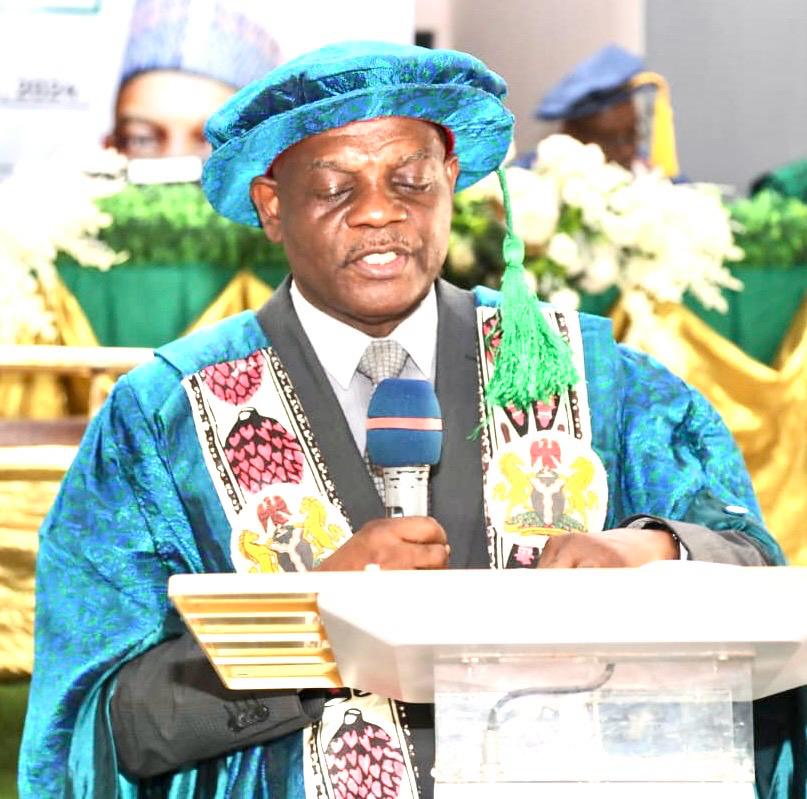
*2024: TETFUND’s YEAR OF POPULAR POSITIVE ATTESTATION*
By Tunde Oladunjoye
As a former member of the Governing Council of Tai Solarin University of Education, Ijagun, Ogun State (2016-2018), I can testify that the major projects we were able to accomplish were the projects funded by the Federal Government of Nigeria through the Tertiary Education Trust Fund (TETFUND).
TETFUND also sponsored many of the university’s staff, academic and non-academic, for continuous training abroad. For a state-owned university, which also witnessed the era of zero subvention from its owners, the state government, one could have imagined what would have been the fate of TASUED without TETFUND.
It was the same situation when I served as a Member of the Governing Council of Federal Polytechnic, Ukana, Akwa-Ibom State. All the major capital projects at the Ukanna main campus of the polytechnic were funded by TETFUND.
This is actually the reality in all the tertiary institutions in Nigeria today. TETFUND has remained the bedrock of infrastructural development for the colleges of education, polytechnics and universities owned by both the federal and state governments.
The Tertiary Education Trust Fund (TETFund) was originally established as Education Tax Fund (ETF) by the Act No. 7 of 1993 as amended by Act No. 40 of 1998 (now repealed and replaced with Tertiary Education Trust Fund (Establishment, Etc.) Act No. 16 of 2011. It is an intervention agency set up to provide supplementary support to all levels of public tertiary institutions with the main objective of using funding alongside project management for the rehabilitation, restoration and consolidation of Tertiary Education in Nigeria.
However, the reality on ground over the years and even now, is that rather than be a supplementary source of funding for the three tiers of tertiary education, TETFUND has turned out to be about the main source of funding for projects, scholarships research and development, publishing and publications.
The strategic support that the agency has provided for education in Nigeria is so effective and efficient that even the promoters of private universities have started began to lobby for accommodation by TETFUND, though unjustifiably.
The main source of income available to the Fund is the 2 percent Education Tax paid from the assessable profit of companies registered in Nigeria. However, the Tax was reviewed upwards to 2.5 percent by the Finance Act 2021 and further increased to 3 percent by the Finance Act 2023 effective September 2023.
The funds are disbursed for the general improvement of education in federal and state tertiary education institutions specifically for the provision or maintenance of essential physical infrastructure for teaching and learning, infrastructural material and equipment research and publications, academic staff training and development, and any other need which, in the opinion of the 13-member Board of Trustees, is critical and essential for the improvement and maintenance of standards in the higher educational institutions.
In 2024, the agency has impacted so significantly that testimonies abound. TETFUND has become the geese that lays the golden, so much that the Nigerian students and their lecturers do not want any harm to come near it, either in the guise of taxation, restructuring, harmonization and what have you.
At different fora and interviews in the outgoing year, the Academic Staff Union of Universities (ASUU) have warned the Federal Government against tampering with the existence of TETFUND, insisting that such a move will badly injure the Nigerian university system.
In an interview with The Guardian newspapers, the Academic Staff Union of Universities (ASUU) cautioned the Federal Government against phasing out the Tertiary Education Trust Fund (TETFund) in favour of the newly introduced Nigerian Education Loan Fund (NELFUND), warning that such a move could severely damage Nigeria’s public university system.
“TETFund has been instrumental in transforming tertiary education across Nigeria for over 30 years. Scrapping it would devastate public universities and deny access to education for children from low-income families,” said ASUU President, Prof. Emmanuel Osodeke, during the interview with The Guardian.
According to Osodeke: “TETFund is the product of our struggle as educators. The government cannot unilaterally decide to dismantle it without engaging those who understand its importance,” Osodeke emphasised.
ASUU proposed that the government explore alternative funding mechanisms for NELFUND, such as allocating a percentage of Value Added Tax (VAT), rather than repurposing TETFund’s consolidated revenue from corporate taxes: “We are not opposed to NELFUND. But the government must find a new source of funding without dismantling the existing framework that has sustained our universities,” Osodeke added.
He highlighted the significant role TETFund plays in providing infrastructure and academic development in public institutions, noting that 90% of physical structures in universities, polytechnics, and colleges of education are products of TETFund.”
ASUU urged the government to uphold the legacy of TETFund, which has inspired similar initiatives like Ghana’s Education Trust Fund (GETFund).
“Countries in Africa are learning from TETFund. Scrapping it now would be a step backward for Nigeria,” Osodeke stressed, appealing to the government to prioritize education funding in line with global standards.
For the avoidance of doubt, the ASUU President affirmed categorically that: “This is not just about ASUU; it’s about the survival of Nigeria’s education system and the opportunities it provides for millions.”
He who wears the shoe, they say, knows where it pinches. It was, therefore, not surprising when the umbrella body for university students in Nigeria, the National Association of Nigerian Students (NANS) joined ASUU to mobilize against any attempt to scrap or reduce revenue accruable to TETFUND.
NANS, at a well-attended event in Lagos, called on the Federal Government for more clarification on the matter. The student body made its position known at the 86th National Senate Sitting and Pre-Convention event held at the Lagos State University (LASU), Ojo. Over 5,000 student leaders from various levels (national, geo-political zones, states, and campuses) across Nigeria attended the event.
The Senate President of NANS, Babatunde Afeez Akinteye, according to The Nigerian Tribune, urged the Federal Government to be transparent about its future plans for TETFUND in the Tax Reform Bills. He emphasized the need to clarify whether the proposed tax reform would negatively affect the agency.
“Every Nigerian recognizes the importance of TETFUND in our educational institutions. Its projects are evident across campuses. Without TETFUND, we cannot imagine what would have become of our campuses.
The agency’s contributions go beyond infrastructural development to include capacity building, research, and innovative activities. For these reasons, TETFUND must not be tampered with but instead properly funded and managed by competent individuals of integrity to ensure even greater performance,” he said.
Not long after, with the opposition against alleged aim of scraping of TETFUND becoming louder and louder, the Federal Government had to come out to dispel the rumours being peddled that there were plans to scrap TETFUND.
Mr. Bayo Onanuga, the presidential spokesman, dispelled the rumour, saying there was no such plan to scrap TETFUND and a few other agencies in the proposed tax bill.
“No part of the tax reform bills currently before the National Assembly (NASS) recommends the scrapping of Tertiary Education Fund (TETFund), National Agency for Science and Engineering Infrastructure (NASENI) and National Information Technology Development Agency (NITDA)”, the Presidency through Onanuga said in a statement.
“Contrary to the lies being peddled, the bills do not suggest that NASENI, TETFUND, and NITDA will cease to exist in 2029 after the passage of the bills. Government agencies, such as NASENI, TETFUND, and NITDA, are funded through budgetary provisions with company income tax and other taxes paid by the same businesses that are being overburdened with the special taxes.”
As the clarification from the Federal Government seemed to have put the mind of the concerned public at rest, desperate people embarked on campaign of calumny against TETFUND and its Executive Secretary, Architect Sonny Echono, who had taken the Fund commendably to greater heights locally and internationally, since he took over the affairs of the agency. The published attacks and lies against TETFUND and its helmsman, mostly on back street social media were born out of envy and mindless hustling of certain people who wanted to wrestle the steering of TETFUND for their ulterior, self-serving and unpatriotic motives.
It is, however, highly commendable that TETFUND and its management continue to remain focused, undistracted in the delivery of their mandate, with the active support of its Board Members picked across the six geopolitical zones of the country and chaired by the former Governor of Kastina State, Rt. Hon. Aminu Masari.
As part of efforts towards revamping the Nigerian economy through promotion and investments in groundbreaking research and innovations, the maiden edition of the National Research Fair/Exhibition has been successfully held in Abuja with innovators, researchers and inventors on the ground to showcase various innovative projects.
The five-day event, which was held between 17th and 21st November 2024, not doubt, lived up to its billings.
The fair represented a significant landmark in TETFund’s quest for promotion of groundbreaking research and innovations and provided an opportunity for researchers and inventors to display local solutions capable of supporting national development.
Speaking at the opening ceremony of the event held at the Eagle Square, the Honourable Minister of Education, Dr. Maruf Alausa, stated that only impactful research and innovation could equip Nigeria with needed elements to transform its fortune, adding that the Federal Government is committed to leveraging research and for economic growth.
He stated that despite being the first of its kind, the TETFUND fair would be held annually to unleash the innate capacities of millions of young Nigerians by giving them opportunities to contribute to economic development through innovation.
The Executive Secretary of TETFund, Arc. Sonny Echono stated that the exhibition was aimed at “showcasing research outcomes from the Fund’s Beneficiary Institutions, as well as other innovations both from the formal and informal sectors with the aim of connecting them to industry for prototype upscale and commercialization.”
He added that the exhibition was also an effort by the Fund to ensure innovators and researchers contribute their quota to revamping the country’s economy, create jobs, as well as generate and redistribute wealth among Nigerians.
In his own remarks at the event, the Chairman, Board of Trustees of TETFund, Rt. Hon. Aminu Masari, reiterated the commitment of the TETFund Board to research development in tertiary institutions, adding that the paucity of funds required for promoting cutting-edge research that are crucial to national development will be significantly addressed under his leadership.
It is hoped that the Federal Government will strengthen TETFUND and not whittle down its powers, influence or resources under any guise even as the Architect Sonny Echono-led management continues its giant, positive strides.
*Tunde Oladunjoye, a journalist, was at various times a Member of the Governing Councils of Tai. Solarin University of Education, Ijagun, Ogun State and Federal Polytechnic, Ukanna,Akwa-Ibom State; sent this via [email protected]*
cover story
Echono to deliver FUTO’s 36th Convocation Lecture
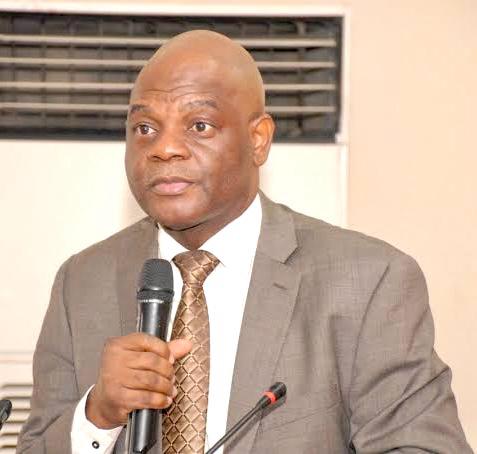
Echono to deliver FUTO’s 36th Convocation Lecture
The Executive Secretary of Tertiary Education Trust Fund (TETFUND) Arch. Sunday Silver Echono, will on Thursday, December 5th, 2024 deliver the 36th Convocation Lecture of the Federal University of Technology (FUTO), Owerri.
The lecture titled “Impact of Leadership Selection on Governance in Public Universities in Nigeria” will hold at Prof. C.O.E. Onwuliri Conference Hall, FUTO main campus, Owerri.
The University’s Vice Chancellor, Prof. (Mrs). Nnenna Oti, will be the Chief Host at the lecture, which is expected to attract participants from within and outside the university community, especially the academia.
FUTO is the oldest university of technology in Nigeria, established in 1980 by Nigeria’s first Executive President, Shehu Shagari. It became the first of three such universities set up by the Federal Government of Nigeria, which sought to establish a University of Technology in each geo-political region, particularly in a state which did not have a conventional university.
Arc.Sunday Sylva Togo Echono OON is a Nigerian diplomat, and architect who serves as the ninth Executive Secretary of Tertiary Education Trust Fund from 2022 till-date. Previously, Echono served as the Secretary of the Admissions Committee of the Nigerian Institute of Architects and the 28th President of the Nigerian Institute of Architects from 2019 to 2021.
Sonny Echono was nominated by the Board of TETFUND in early 2022 and was subsequently appointed as the substantive 9th Executive Secretary (ES) of TETFUND on March 18, 2022, by former President Muhammad Buhari.
A former permanent secretary in federal ministries, Echono had been honoured by governmental and non-governmental bodies locally and internationally. He is a recipient of Officer of Order of Niger (OON).
cover story
LAUTECH Emerges Qualifier at NOA Southwest National Values Debate
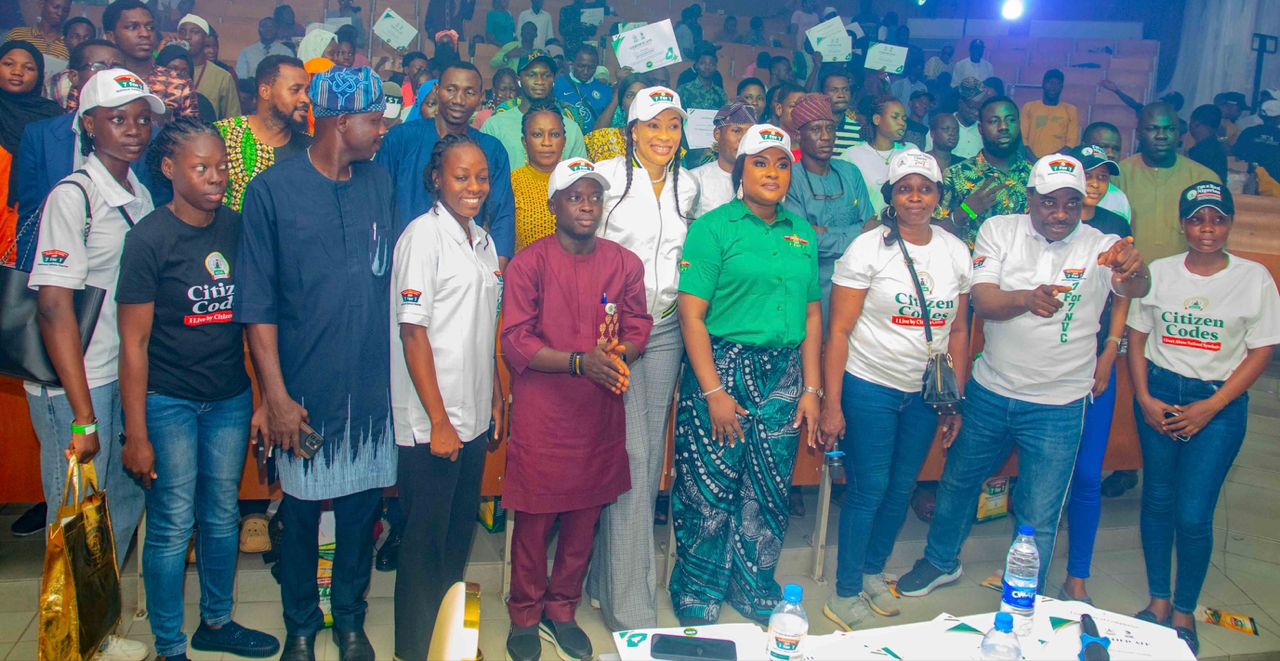
LAUTECH Emerges Qualifier at NOA Southwest National Values Debate
In a thrilling display of intellect and oratory, Ladoke Akintola University of Technology (LAUTECH) has been crowned the Southwest champion at the 7 for 7 National Values Charter Campus Debate and Capacity Building Conference. The event, organized by the National Orientation Agency (NOA) and held at the Julius Berger Hall of the University of Lagos, aimed to inspire a culture of national values and civic responsibility among Nigerian youth.
The competition culminated in a gripping debate between LAUTECH, represented by Adekunle Ayomide and Oladeji Olushina, and the University of Ibadan, represented by Oyedijo Olarenwaju and Chineke Ugochukwu. The teams dissected the topic, “7 for 7 National Values Charter: Striking the Balance Between Government Promises and Citizens’ Responsibilities in Nation-Building,” presenting compelling arguments that explored the intricate interplay between governance and civic duty.
LAUTECH’s Adekunle Ayomide impressed with his calm yet authoritative delivery, while Oladeji Olushina’s vivid examples underscored the importance of shared responsibility. Their counterparts from the University of Ibadan countered with historical insights and pragmatic solutions, making the contest a true battle of wits.
After intense deliberations, the judges awarded LAUTECH the southwest championship title, earning them a ₦5,000,000 prize and a ticket to the grand finale, where they will compete for the ultimate ₦20,000,000 prize.
The event was more than a competition. A capacity-building segment led by distinguished facilitators offered invaluable insights to attendees. Oluseye Taiwo Adepoju, renowned as “The Oracle” and a Gallup-Certified Strengths Coach, delivered a session on leadership and personal development, encouraging participants to harness their unique strengths for societal impact.
Dr. Leonard Okonkwo, a Consultant Clinical Psychologist, engaged the audience with an exploration of human behavior and its role in national progress. Through practical exercises and anecdotes, he emphasized the need for mental and emotional resilience in achieving personal and societal goals.
Tolu Meduna, the program coordinator, articulated the essence of the initiative: “Our goal is to raise Citizen Values Brigadiers—youths who will champion the ethos of unity, accountability, and resilience. This is how we build a stronger Nigeria.” Meduna also outlined the event’s national scope, noting that the debate series will span all six geopolitical zones of the country, with the ultimate winner determined by online viewers at a live broadcast event.
The conference attracted notable dignitaries, including Hon. Moruf Akinderu Fatai, Lagos State Commissioner for Housing; Hon. Opeyemi Alabi, Senior Special Assistant to the Lagos State Governor on Youth Mobilization; and Izehi Semira, Founder of Shape A Child Initiative. Hon. Fatai lauded the initiative, stating, “This aligns perfectly with our collective mission to create a Nigeria where values drive progress.”
As the curtains fell, the 7 for 7 National Values Charter left an indelible mark on participants. Beyond the awards and accolades, the initiative ignited a renewed commitment to unity, accountability, and national development. All attendees received Citizen Values Brigade certificates, symbolizing their role as ambassadors of change. The National Identity Project is championed by the director general of the National Orientation Agency, Mallam Lanre Issa Onilu.
For LAUTECH, the journey to the national grand finale promises new challenges and opportunities. For the nation, the message was clear: embracing shared values and responsibilities is the path to a brighter future.
The value train continues its journey, uniting hearts and minds in a shared vision of progress and national pride.
-

 celebrity radar - gossips6 months ago
celebrity radar - gossips6 months agoWhy Babangida’s Hilltop Home Became Nigeria’s Political “Mecca”
-

 society6 months ago
society6 months agoPower is a Loan, Not a Possession: The Sacred Duty of Planting People
-

 society5 months ago
society5 months agoReligion: Africa’s Oldest Weapon of Enslavement and the Forgotten Truth
-

 news6 months ago
news6 months agoTHE APPOINTMENT OF WASIU AYINDE BY THE FEDERAL GOVERNMENT AS AN AMBASSADOR SOUNDS EMBARRASSING

